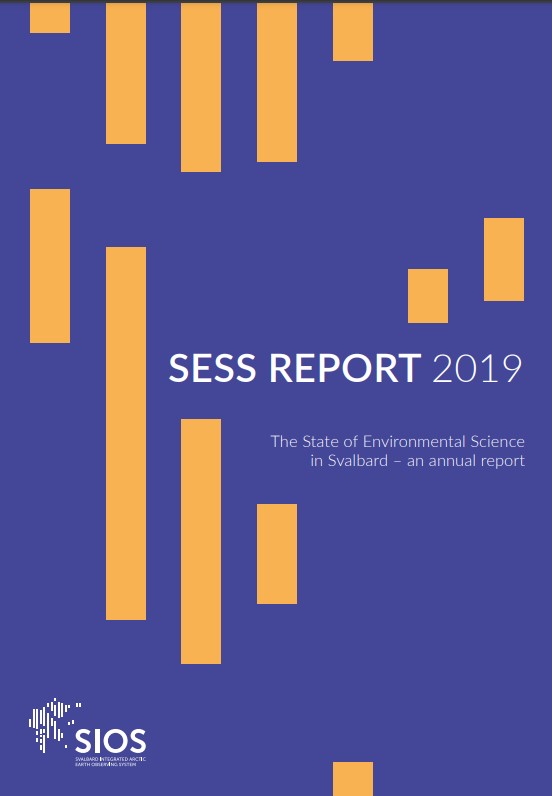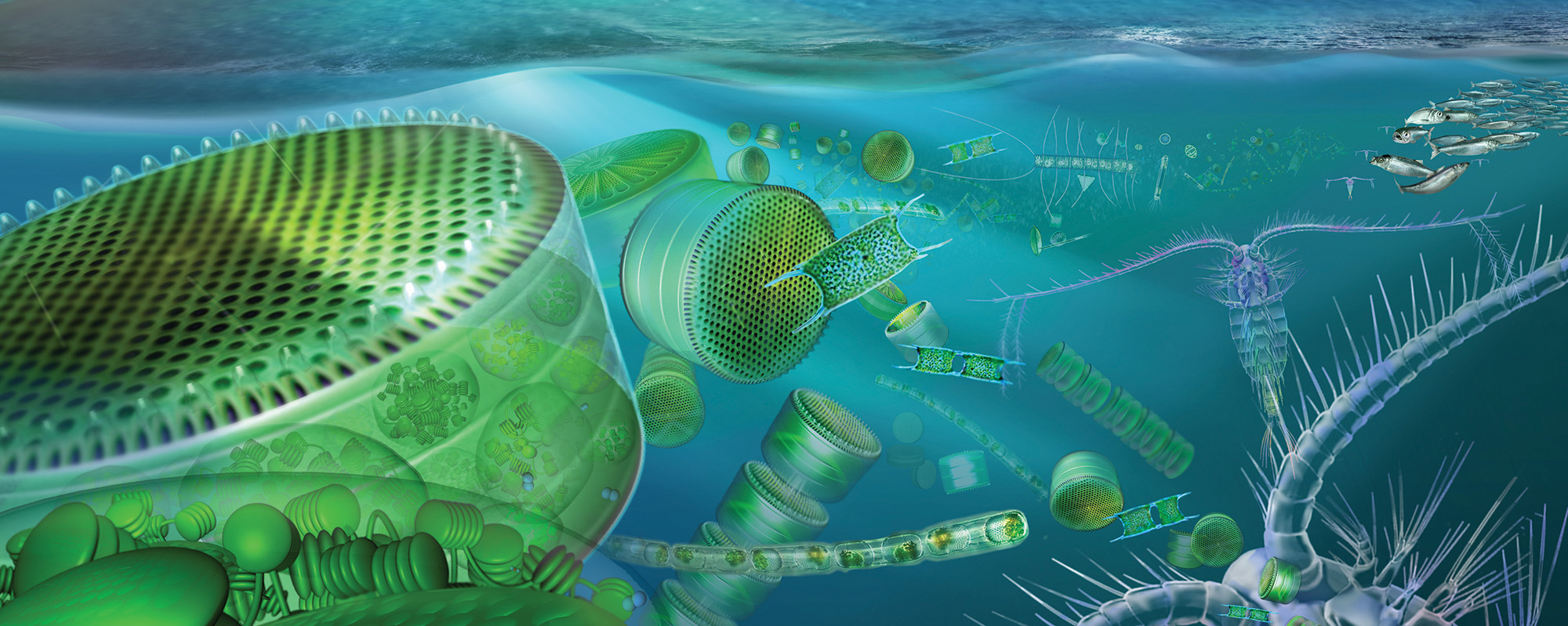Reports and ecological assessments
The bellwether of ocean health: why we monitor plankton.
In addition to playing a fundamental role in the earth’s climate system and in marine food-webs, plankton are also highly sensitive indicators of environmental change and provide essential information on the ‘ecological health’ of our seas. Plankton indicators have had a long history in ecological monitoring of the marine environment. Over the past decade, these applications have been refined and used as management tools by developing applied ecological indicators to support specific evolving marine management issues and to provide evidence-based information for policy (Edwards et al., 2010).
Planktonic indicators are particularly useful in assessing the marine environment as they can provide information on a whole multitude of management issues, ranging from climate change impacts; fisheries and marine wildlife; eutrophication/pollution; ocean acidification; marine biodiversity and invasive species.
Ecologically speaking and on a planetary scale, plankton and pelagic ecosystems as a metaphorical collective entity, are perhaps some of the most sensitive organisms to environmental change and one of the most important biological communities on the planet. They are responsible for the overwhelming majority of marine biological production that fuel marine food-webs and nutrient cycling as well as contributing to approximately half of the world’s oxygen production and carbon sequestration. Future biological monitoring of these ecosystems, through an integrated and sustained observational approach, will be essential in understanding the continuing impacts of climate and global change on our planetary system.
*Edwards, M., Beaugrand, G., Hays, G.C., Koslow, J.A. & Richardson, A.J., 2010. Multi-decadal oceanic ecological datasets and their application in marine policy and management. Trends in Ecology and Evolution,25: 602-610.
GLOBAL ECOLOGICAL ASSESSMENTS
The Second World Ocean Assessment (WOA II), is the newest outcome of the only integrated assessment of the world’s ocean at the global level covering all three pillars of sustainable development.
WOA II is a collective effort of interdisciplinary writing teams made up of more than 300 experts, drawn from a pool of over 780 experts from around the world. It provides scientific information on the state of the marine environment in a comprehensive and integrated manner to support decisions and actions for the achievement of Sustainable Development Goals, as well as the implementation of the United Nations Decade of Ocean Science for Sustainable Development.
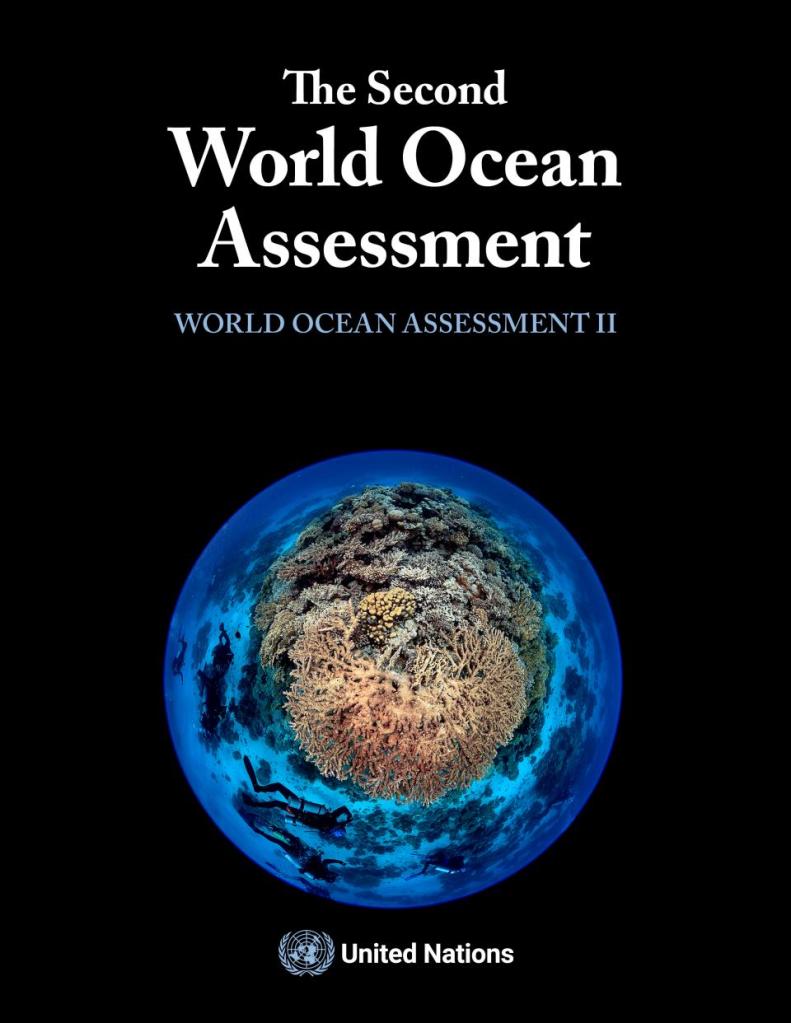
GACS Global Assessments
Global Alliance of Continuous Plankton Recorder Surveys (GACS).
GACS brings together the expertise of approximately 60 plankton specialists, scientists, technicians and administrators from 14 laboratories around the world, towing a common and consistent sampling tool, the Continuous Plankton Recorder, from about 50 vessels. Working together, pooling our data and resources, is essential in order to understand the effects of environmental changes on plankton biodiversity at a global level. Numerous local and regional monitoring and observational programmes have been established in the past, but have lacked a holistic perspective on plankton biodiversity in response to global events such as global warming and ocean acidification. GACS is working towards that global perspective using CPR data, a well recognised and standardised methodology. It will also allow us to assess changes and events at a local or regional level in a world-wide context. At the heart of GACS is the development of the global database of CPR data that will allow us to make such assessments of local, regional and global changes. Subsequently, an important product of GACS is the production of a Ecological Status Report for global plankton biodiversity (see below).

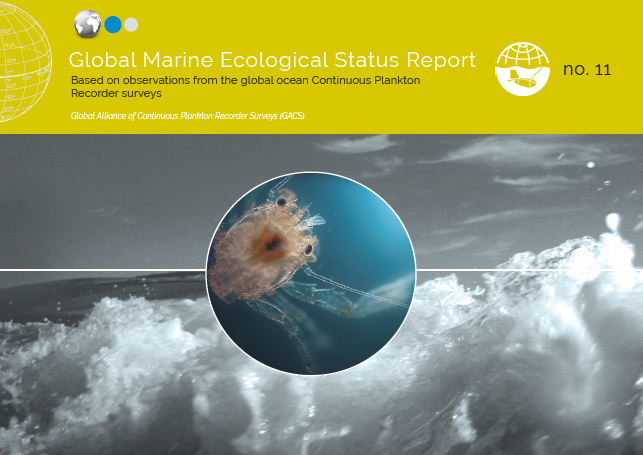
UK and European Horizons reports and assessments
EU project CLAMER
CLAMER is a European Union 7th Framework Programme project Climate Change and Marine Ecosystem Research, involving 17 marine research institutes and universities from 11 European countries covering all regional seas. The project builds upon the concept that there is a gap between what is known through research and what policy makers and the public know and understand about the effects of climate change on the oceans; this gap needs to be filled to help catalyse formulation and acceptance of the necessary mitigation and adaptation measures for the marine environment.
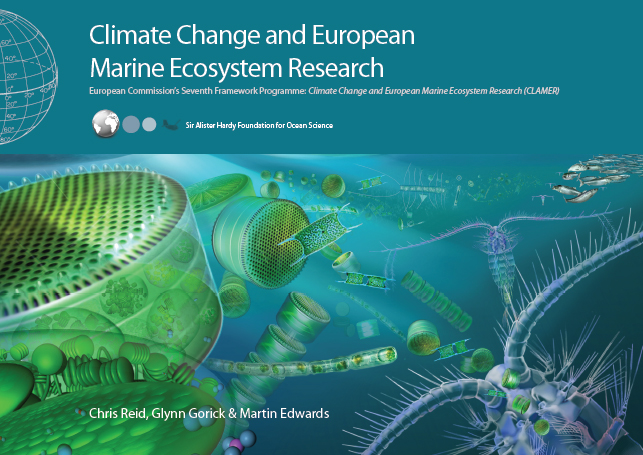
Marine Climate Change Impacts: Report Card 2020
Marine Climate Change Impacts Partnership (MCCIP) Report Card 2020 summarises the latest evidence from 26 topics regarding the physical, ecological, and social and economic impacts of climate change on UK coasts and seas. New topics for this year include oxygen, cultural heritage, and transport and infrastructure.
More than 150 scientists from over 50 leading research organisations have contributed to this year’s Report Card, producing 26 peer-reviewed scientific reports which give detailed information regarding the evidence bases on UK marine climate change impacts.
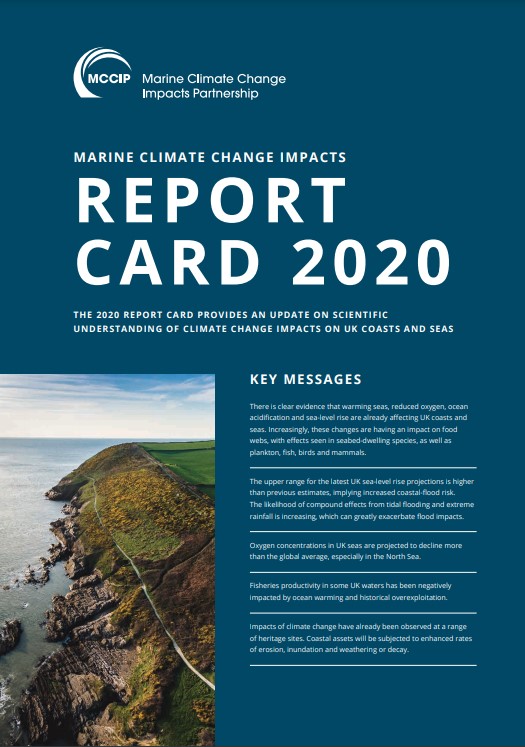
Key headlines
- There is clear evidence that warming seas, reduced oxygen, ocean acidification and sea-level rise are already affecting UK coasts and seas. Increasingly, these changes are having an impact on food webs, with effects seen in seabed-dwelling species, as well as plankton, fish, birds and mammals.
- The upper range for the latest UK sea-level rise projections is higher than previous estimates, implying increased coastal-flood risk. The likelihood of compound effects from tidal flooding and extreme rainfall is increasing, which can greatly exacerbate flood impacts.
- Oxygen concentrations in UK seas are projected to decline more than the global average, especially in the North Sea.
- Fisheries productivity in some UK waters has been negatively impacted by ocean warming and historical overexploitation.
- Impacts of climate change have already been observed at a range of heritage sites. Coastal assets will be subjected to enhanced rates of erosion, inundation and weathering or decay.
EU project AtantOS
The vision of AtlantOS the project was to improve and innovate Atlantic observing by using the Framework of Ocean Observing to obtain an international, more sustainable, more efficient, more integrated, and fit-for-purpose system. Hence, the AtlantOS initiative is a long-lasting and sustainable contribution to the societal, economic and scientific benefit arising from this integrated approach. This was delivered by improving the value for money, extent, completeness, quality and ease of access to Atlantic Ocean data required by industries, product supplying agencies, scientist and citizens.
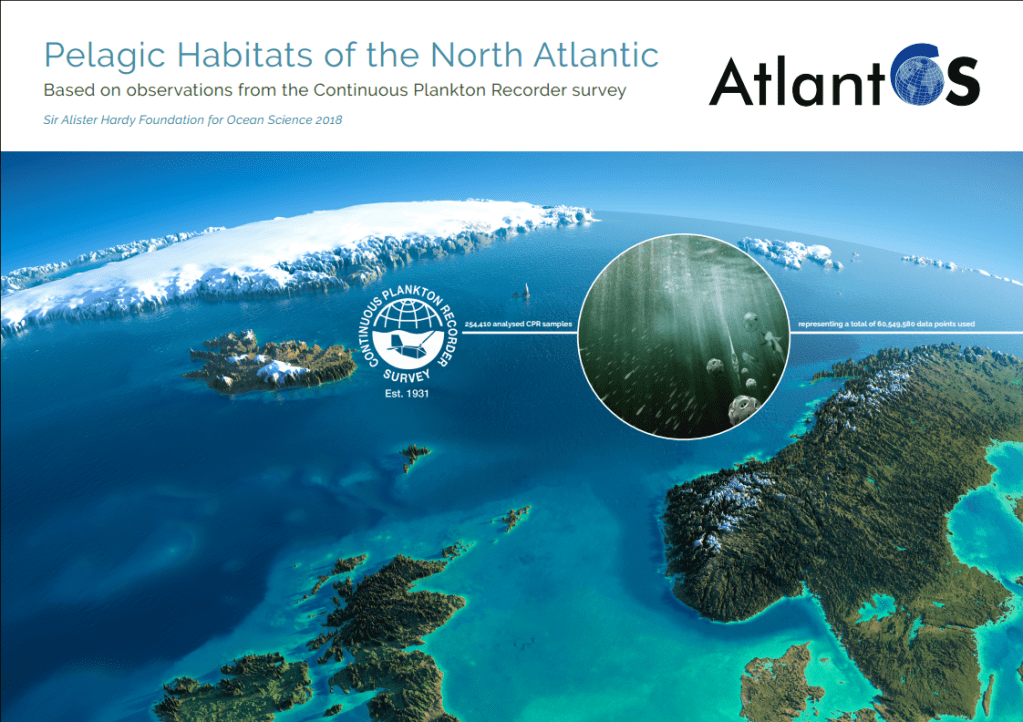

North Atlantic biogeographic atlases
Atlas of North Atlantic fish larvae
The project has resulted in the creation of a unique fish larvae database of the NE Atlantic, North Sea and adjacent areas from 1948-2005.
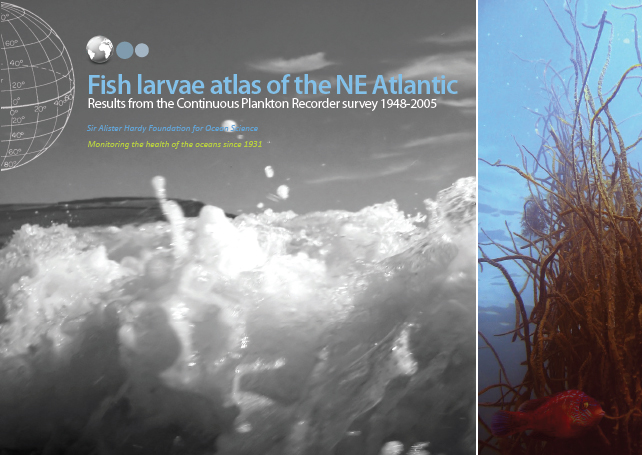
Atlas of North Atlantic calcifying plankton
The European Project on Ocean Acidification (EPOCA) gathered scientists from 29 partner institutions and 10 countries. It had the goal to investigate ocean acidification and its impact on marine organisms and ecosystems. One of its work packages aimed to study whether ocean acidification could affect the distribution of planktonic organisms in the North Atlantic.
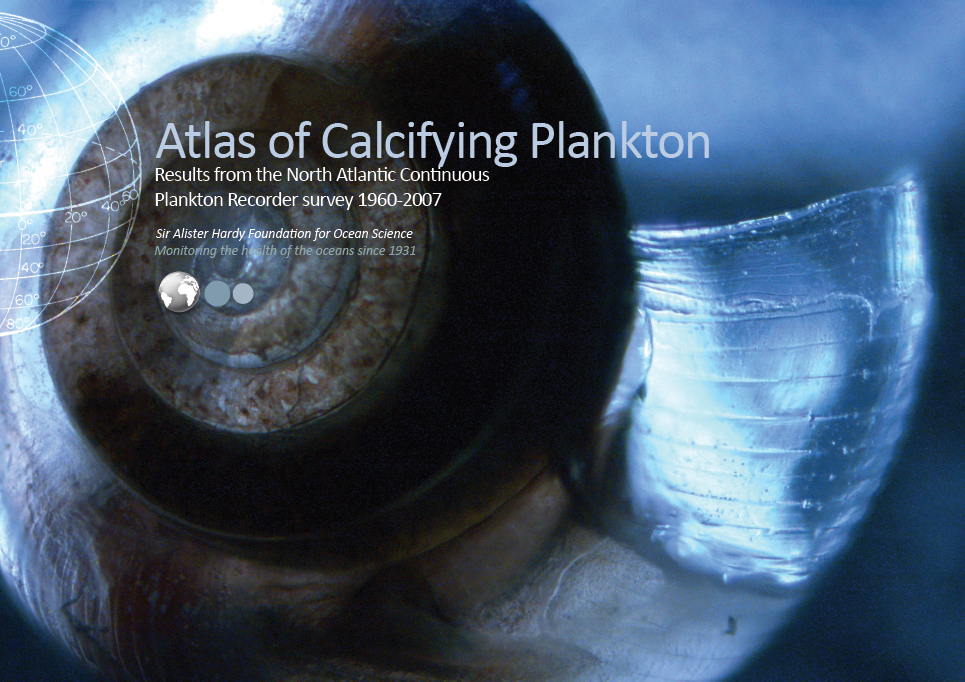
Arctic Climate change reports
Arctic climate change update 2021: summary for policy makers. Arctic Monitoring and Assessment Programme.
Over the past 50 years, the Arctic has warmed three times faster than the world as a whole, leading to rapid and widespread changes in sea ice, land ice (glaciers and ice sheets), permafrost, snow cover, and other physical features and characteristics of the Arctic environment. These changes are transforming the Arctic, with far-reaching consequences.

The State of Environmental Science in Svalbard (SESS) report
The Svalbard Integrated Arctic Earth Observing System (SIOS) is an international multidisciplinary research infrastructure for observing the Arctic Earth. SIOS concentrates on long-term observations important for global environmental and climate change, to observe, attribute and describe the effects of the change. The central instrument for developing SIOS, guiding the next years’ work within SIOS and reporting the achievements during the last year is this annual SESS report.
See pages 262- 273 for plankton assessment
